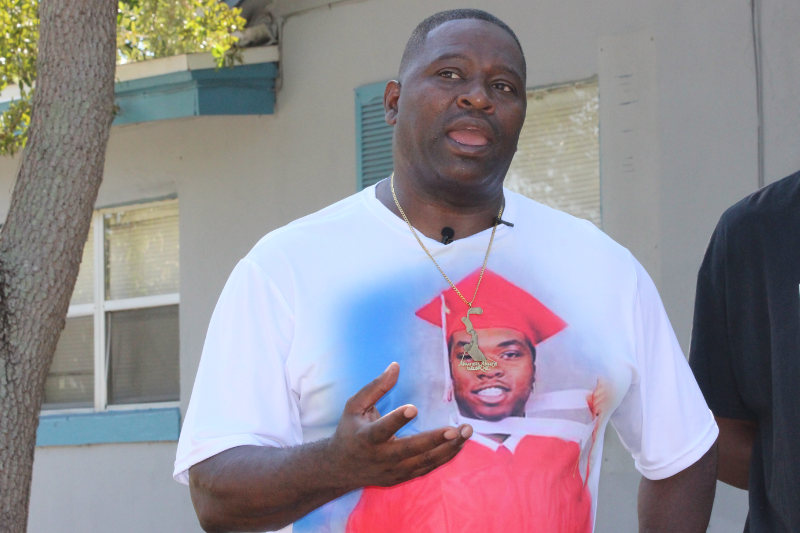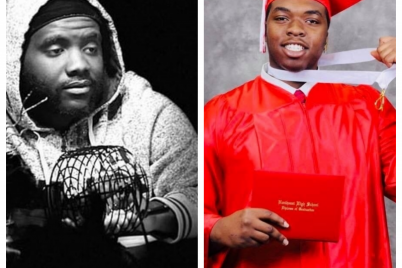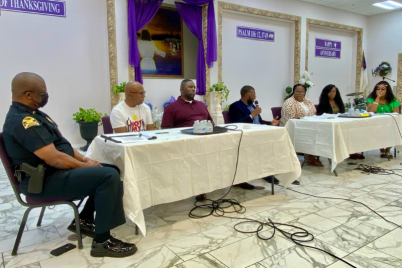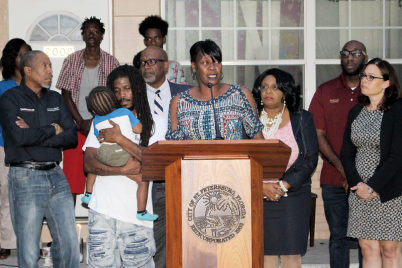Maress Scott, co-founder of Quis for Life, presented a training session on ending gun violence among our youth at the Foundation for a Healthy St. Petersburg on Sept. 15. Pictured on Sept. 16 at a small gathering honoring the life of his son, Marquis Scott.
BY FRANK DROUZAS, Staff Writer
ST. PETERSBURG — To raise awareness about gun violence and its profound impact on the community, Quis for Life, Inc. presented “Five Keys to End Gun Violence Among Young People,” an enlightening training session and discussion. The event, held at the Foundation for a Healthy St. Petersburg on Sept. 15, aimed to explore topics like the influence of alcohol, drugs and the “no snitching” culture on community violence.
Maress Scott, co-founder of Quis for Life, played a video of youths who have been victims of gun violence in the last few years in St. Pete, including Marquis Scott, his son, who was shot and killed while riding his bike in 2019.
It touched some in attendance on a personal level, as they knew some of the young victims. Rev. Kenny Irby, who knew 17-year-old Gabriel Wallace, said he sees the “continued trauma in the family and in that segment of the community still to this day.”
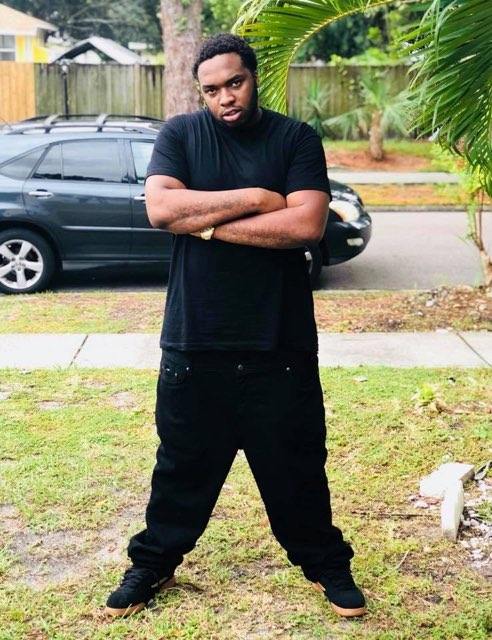
On Sept.17, 2019, Marquis Scott was shot and killed while riding a bicycle around his grandmother’s neighborhood.
Scott said that gun violence is the leading cause of death for teenagers in this country.
“In fact, here in Florida, African Americans are seven times more likely to lose their life or be impacted by gun violence,” he said, adding, “if we don’t get hold of it now, this thing can spiral out of control.”
Scott presented the Five Keys as a series of questions: Who is affected by gun violence? What role do alcohol and drugs play? Why do we remain silent? How can we make a change? When should we make a change?
He recalled the day when he went with his son to a Salem’s fast-food restaurant, his son’s infectious smile as he talked about his life and his friends.
“As a dad, I enjoyed that moment we had talking together,” Scott recalled.
Scott then dropped off his son at his mother-in-law’s, where he would stay before biking to an appointment the next day. Scott told his son to remember to say his prayers and to be on time tomorrow. Marquis held up two fingers for his father to see before he left, signifying they were “two peas in a pod.”
“When I made it home, I got a phone call from my daughter telling me that my son had been shot,” Scott said. As he raced to the scene where his son was, Scott said he “was dying all the way there.”
“They said when they walked up to my son that he was trying to say something, and all I could imagine that he was saying was, ‘Get my dad, get my dad.’ And I wasn’t there.”
Scott pointed out that the families of both the victim and the shooter are traumatically affected when it comes to gun violence. Teachers and coaches in schools who have invested so much time with these young people are affected, including many faculty members at Northeast High, where Marquis graduated.
Although Marjorie Scott, Marquis’ mother, was present, she taped her comments about her son because reliving the trauma time and time again is too heartbreaking. Feeling hopeless and desperate since losing her son, she would “wake up every morning to a nightmare knowing that I have to live my life without one of my children.”
Marjorie Scott, a mother of five, said, “Our life is just drastically changed forever.” She stressed that violence to settle arguments is not worth it and urged everyone to “put down the gun, put down the knife, just try to resolve things with your words or just walk away from it.”
Marquis’ sister, Mary Scott, said in the video that since her big brother, who was like a hero to her, was killed, it’s “been a lot of pain for me and the family.” Her father said that Mary had to undergo therapy, and she was so traumatized that, for a time, she couldn’t sleep in her own room.
“She couldn’t even take a shower unless her mom was standing in the doorway and the door couldn’t be closed,” Maress Scott stated.
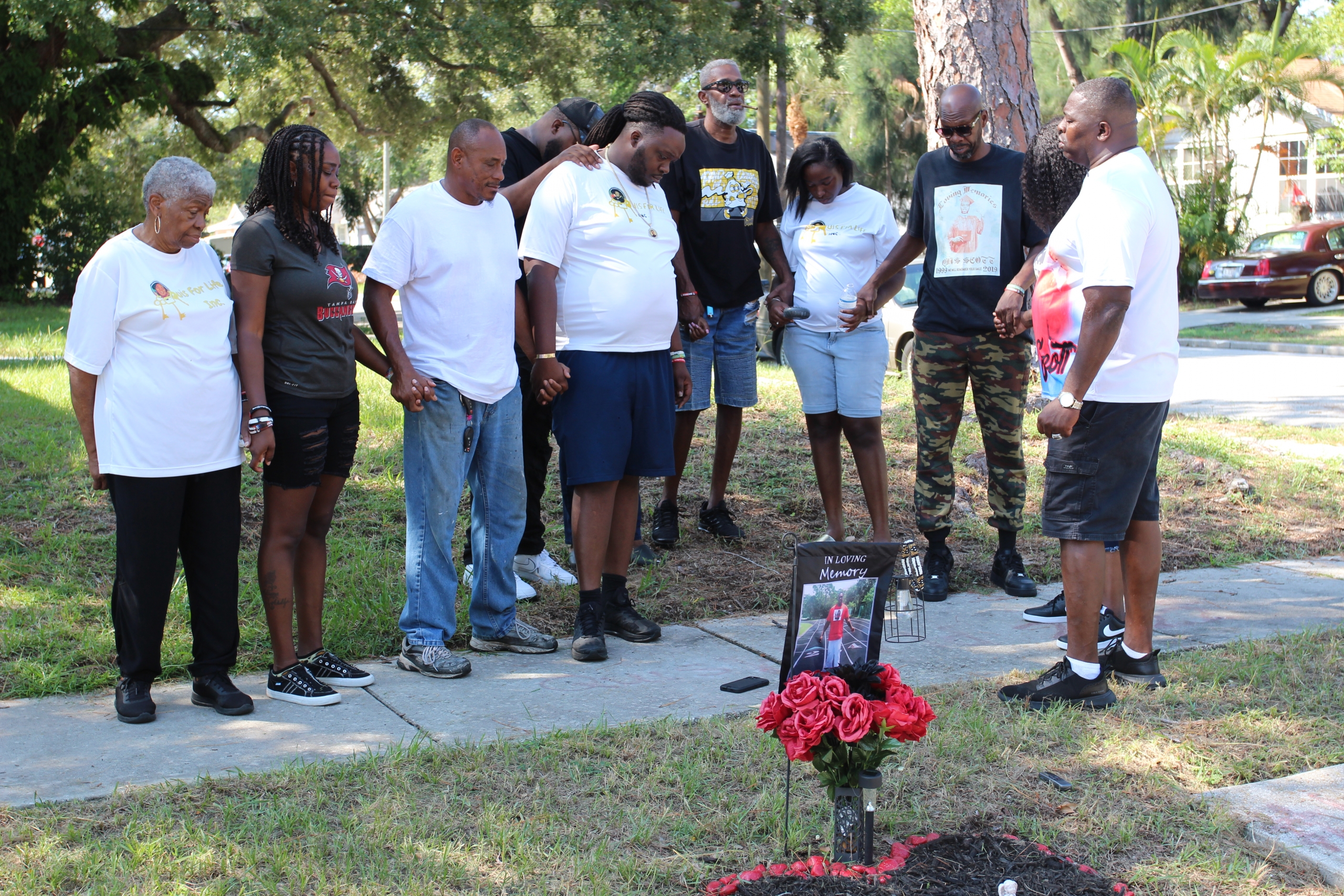
‘When you have guns, people are dying, going to prison, families are left depressed,’ said Maress Scott. ‘Even if you go to prison and come home, the likelihood of living in poverty is high because almost no one wants to hire a murderer.’ Pictured, the Scott family gathered around where Marquis was killed on the corner of Queensboro Avenue and Yale Street South for a small family memorial on Sept. 16.
Often, drugs and alcohol are involved when gun violence occurs between young people, Maress Scott said, citing a study that said that 90 percent of children arrested for gun violence had been high or drunk at the time.
“Kids drinking and doing drugs, it leaves them in a position where they’re easily influenced,” he said. “In fact, there are two kids that I heard of that were arrested for murder. They woke up in jail, didn’t know that they committed a crime, and never went home again.”
Another reality is that sometimes people in the community are afraid to report murders, but Scott said there are ways to report violence.
“There are ways that you can talk to someone when someone has been shot, or someone has a gun,” he explained. “You can talk to the police. They have phone calls that you can make where you could be anonymous. Kids can talk to adults, to their teachers. Even the state attorney has a back door where parents can bring their children to report serious crimes. I’ll be honest with you: as parents, you may not know who has the guns, but the kids do.”
Valerie Bethune, whose youngest son is serving a life sentence for homicide, said that although she felt her son was raised right, the streets were calling him.
“Still, to this day, everybody hurts, and it’s a hurt that I cannot describe to you. It does not go away,” Bethune said, adding that it affects everyone.
She suffers from panic attacks and depression after visiting her son in prison, and her doctor advised her to stop going to save her health.
“Please understand you’re not the only ones upset,” she said. ‘Whatever you do, whether someone dies or you kill someone, you take a whole bunch of people with you, and they hurt like they were the ones who died or they’re the ones that did the crime.”
Imploring kids to ignore the “no snitching” culture when it comes to something as serious and deadly as gun violence, Scott asked teens to always turn to an adult when they know someone who has a gun.
“Right now, it’s time to take a stance,” he said. “We’ve experienced so much trauma growing up that it’s easy to think that somebody in the next community, down the street, went to school with you that looks like you is the problem. Well, I tell kids all the time that there’s no one who stands in between you becoming who you are; there’s no real opposition except yourself. You can make the decisions.”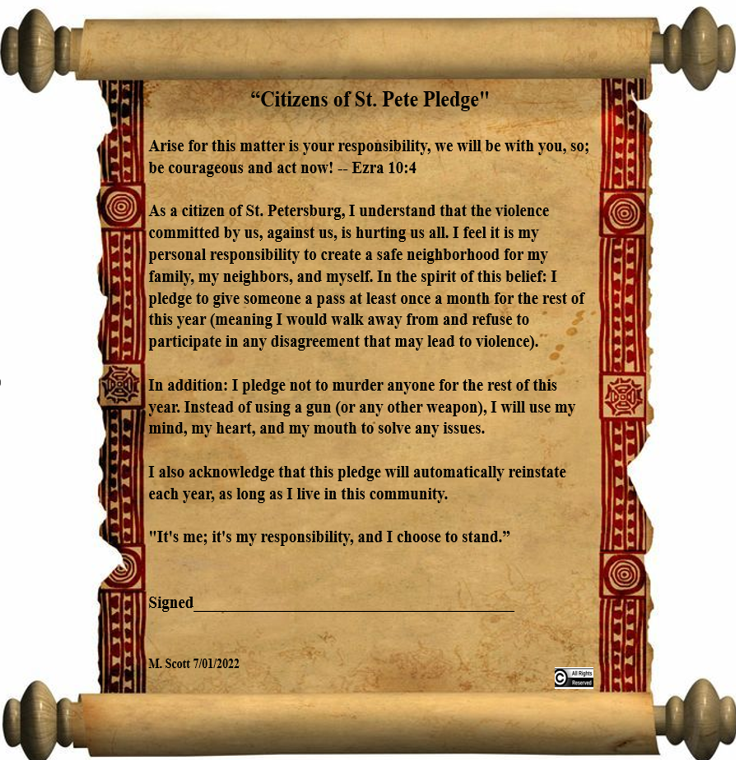
Now is the time to adopt a nonviolent lifestyle, he said, appealing to young people, and it’s time to decide that “you are going to be the person responsible for safety in your community by deciding to be safe yourself.”
He urges the community – young and old — to take a yearly pledge to keep everyone safe, which includes refusing to engage in deadly gun violence and walking away from arguments that could escalate into something with deadly results.
Dr. LaDonna Butler, licensed mental health counselor and founder of The Well for Life, was on hand to help participants if they were experiencing physical, mental, or spiritual discomfort after the session. She encouraged participants to seek help if the pain persists.

